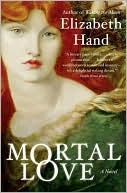 I started writing this as a comment to my last Mortal Love post. When I saw how long it was becoming, I thought it would probably be best if I just started a new post. This is not a review. Sometimes there’s a lot of ideas that have to write their way out of my head. Which is exactly why the book Mortal Love has become special to me: it prompts ideas.
I started writing this as a comment to my last Mortal Love post. When I saw how long it was becoming, I thought it would probably be best if I just started a new post. This is not a review. Sometimes there’s a lot of ideas that have to write their way out of my head. Which is exactly why the book Mortal Love has become special to me: it prompts ideas.
I’ve been mulling this over for a few days, thinking about how stories are told, the kinds of narratives I like, and how I like to experience them. As a reader, I realize that there are moments in Mortal Love when I am experiencing the book differently than I experience other books and that there’s a shift in the way I usually read. With any other book I might cry out in irritation at the author because I’m not entirely sure what’s going on. Yet I never seem to do that with Mortal Love. Instead, I have this feeling of trust towards Elizabeth Hand and with each new development I just want to go with the flow of the story. I trust that she knows where she wants to lead me and how she wants the story to unfold. She never reveals things too much or too little, but just the right amount to answer the big questions and still tantalize me with more.
At the end of the story, I don’t have all the answers. I have the ones that matter.
I still have a few lingering questions. Where that might irritate me in another book, it seems to be one of the things I love about this one, because the questions that linger are the ones that I ultimately don’t want answers to — answers will shatter the illusion, breaking apart the strange emotional haze that this book creates.
There are moments in this book that confuse me and yet I delight in my confusion. I felt like every character who had ever interacted with Larkin must have felt a dizzying amount of confusion and so, in that respect, I was experiencing something similar and could understand what they must have felt. For most of the characters, the source of their confusion is that Larkin is a person who can’t be understood. We have this human tendency to label everything and everyone, compartmentalizing everything in its appropriate place. We have our unwritten societal rules that tell us how things should be done and when or why. For the most part, normalcy is our guideline and often creative people fall outside of those norms and are labeled as eccentric. And yet, even though these societal rules say to shun the eccentrics, we can’t. We are drawn to them. We admire them. We want to be them.
Artists, musicians and writers in Mortal Love are drawn to their muse (Larkin, in this case). She, in turn, is drawn to them because she has this need to be a part of this creative dance that she doesn’t quite understand. No one understands it. It’s elusive and you can’t explain it. It’s unanswerable. It just is. As far as Larkin’s story goes, she’s compelled to be a part of this creativity because she comes from a place where it doesn’t exist. Our ability to create is inherently human and it fascinates her. And from the human point of view, she inspires and feeds their creativity. Their world takes on a different hue when Larkin is in their life. It comes with a heavy price, however, because while she feeds their creativity she seems to drain their soul. Without realizing it she takes and takes until their life is in shambles. She is the muse that inspires while destroying, creating beauty and destruction simultaneously.
I find it even difficult to write a synopsis of the book. It has layers upon layers, multiple protagonists and nuances that I just can’t capture. If I write about it too much, I’m afraid I will have deconstructed it to the point that I can’t be fascinated by it anymore. It will kill that elusive thing, whatever it is, that makes this book feel alive to me. So, I will just end by saying that I think it is a beautiful piece of work and I respect Elizabeth Hand for not only taking it on, but doing it so well. The story is still there, in the back of my mind, replaying in a foggy recreation as if it was something I dreamed. Not a saccharine dream where everything is wonderful, but a better kind of dream. The kind where good and bad are balanced and horrible, tortuous things happen and must exist because that makes the beauty in our world so much stronger. In a nutshell, I think this story resonates with me because it reflects my own personal views about beauty and the pursuit of it: true beauty is found in the rough spots. It’s what emerges from the ugly and painful and the only way to deal with trauma is to create. Pain can not be avoided, but eventually it can be used as a basis for something wonderful and new. Something that is uniquely yours.

Thank you for the recommendation. I have ordered it and look forward to reading it. Can I say, I think you are a real “stunner” yourself. Do you ever dress up in pre-raphaelite costume yourself? Any pictures? (Hope that’s not impertinent!)